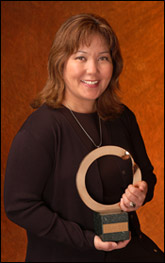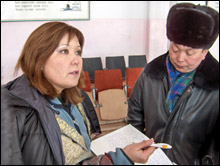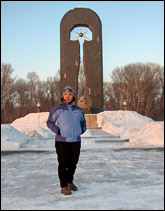
Kaisha Atakhanova.
Photo: Goldman Environmental Prize.
The Republic of Kazakhstan bears the scars of its Soviet past. Intensive agriculture has drastically shrunk the inland Aral Sea, creating one of the world’s worst ecological disasters, while decades of nuclear testing have poisoned the landscape and its people. The country — which is dominated by vast stretches of steppe grassland, and underlain by rich oil and mineral deposits — currently harbors some 237 million tons of nuclear waste.
Kaisha Atakhanova, a biologist from Karaganda, Kazakhstan, has dedicated herself to repairing this damage. The founder of the Karaganda Ecological Center, or EcoCenter, Atakhanova recently helped defeat legislation that would have allowed even more nuclear waste to be commercially imported into the country. She and her allies argued that Kazakhstan’s mineral wealth made it unnecessary for the country to earn money from waste disposal, and pointed out that contamination would discourage international tourism.
EcoCenter’s broad and well-orchestrated campaign led the national parliament to drop the legislation in late 2003, and the victory has encouraged the growth of a grassroots environmental movement in Kazakhstan. Atakhanova, 47, continues to direct the EcoCenter, and has helped to develop a nationwide network of more than 100 activist groups.
Kaisha Atakhanova was awarded one of six 2005 Goldman Environmental Prizes in a ceremony in San Francisco on April 18. Atakhanova plans to invest her $125,000 prize in educational and environmental projects in Kazakhstan. She spoke to Grist through a translator.
How has the Soviet nuclear legacy affected the people of Kazakhstan?
Over 100 tests were done openly in Kazakhstan, and many more were done underground. Together, the radiation was more than 100 times that of the Hiroshima bomb. Many millions of people were affected by it. The nuclear testing site was closed by the president of Kazakhstan in 1990, but he was not able to stop the radiation. That will continue for years to come. And the worst effects were not with the first and second generations of people — the worst will come with the third, fourth, and fifth generations.
What inspired you to found the EcoCenter?
I used to do a lot of scientific research [on the genetic effects of radiation exposure], but I realized that it was only useful for me, not for doing anything good for the people around me. I needed to make a change, to work with the people who had been exposed to radiation. EcoCenter has [operated] for 12 years, and many biologists and former students now work with me. Our purpose is to provide information to people so they can understand the conditions they are living in, and how to change them.

Atakhanova circulates a petition as part of her anti-nuclear efforts.
Photo: Will Parrinello.
Who have your strongest allies been?
It’s really hard to do the work we do by ourselves. There were a total of 15 organizations that started our campaign, and now there are 100 of us [in a network called EcoForum]. We’ve also gotten a lot of support from our Russian colleagues — from environmental groups in Russia — and from other international colleagues and donor organizations.
Tell me how you stopped legislation that would have allowed nuclear waste to be commercially imported into Kazakhstan.
It was a two-year-long campaign. We did not do a public protest on the street with banners. Instead, we had long conversations with scientists, with people in politics, and we did a “fax attack.” People put together letters and sent them to parliament by fax. A kids’ organization wrote letters to the president’s wife, and youth groups organized debates on the issue — everybody had a role, everybody, on their level, contributed to the campaign. So the government received a very well-thought-out campaign.
Sometimes it’s not very productive to yell and scream — we had a very strong argument, with very good background on the issue.

A local memorial pays tribute to victims of Soviet-era nuclear testing.
Photo: Will Parrinello.
What do you think convinced the government to listen to you?
They realized that we had a very strong backbone and a lot of expertise, and that there were a lot of people supporting us — that this was bigger than the territory of Kazakhstan.
How has this victory affected the environmental movement in Kazakhstan?
It was very important to have this victory, very important for the movement to realize that we could make this happen. Our experience was used by other organizations in their campaigns — environmental organizations fighting deforestation used our strategy. We even put together a brochure about our strategies. This campaign was also very important in getting the government to acknowledge us. We’ve become like partners for the government — now, they turn to us as experts.
What do you consider the most serious environmental problem facing the country today?
The majority of our problems are coming from our use of natural resources — gas, oil, uranium. A lot of problems are coming from the fact that we’re seen as a resource country, that people are taking resources from the land without thinking of the environmental impacts. When we have economic, political, and environmental issues involved, the political and economic issues usually swing over the environmental issues. We hope the environment will become a bigger part of our decision-making process.
What do you hope Kazakhstan looks like in 20 years?
I hope that in 20 years, there will be a stable government with stable politics, and a clear policy on environmental impacts. I hope we will have a sustainable and truly democratic state.


